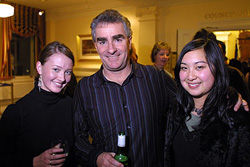This is the week my Dad didn't have a stroke.
Say what you like about this nanny state, our family is grateful that he had to get a medical check-up to keep his driver's licence once he turned 80, we're grateful that his GP noticed that his left carotid artery was almost completely occluded and we're grateful that in the space of just a few weeks, the health system was able to assess him, operate successfully and send him home in perfect shape.
Turns out it was in the nick of time. He'd had symptoms - but stoically said nothing about them in the week preceding his scheduled procedure - which proved to have been mini-strokes. You can read here about the imminent risk he was dicing with.
They operated on Wednesday. There's a five per cent risk of stroke while you're on the table for this procedure so we had a few tense hours, but as anxious waits in hospitals go, you can do much worse.
All of this took place in the shiny new Auckland Hospital, and it was my first visit to the place. What a shambles. Nothing works, you can't find your way around, staff are unhelpful and surly and the overwhelming sense you get is of barely controlled chaos. As if. You could usefully apply aspects of that description to your typical Westfield mall, but from what I saw, you can't attach any of it to Auckland Hospital. It's a huge enterprise and it all functions with an efficiency and capability that is quite impressive.
I don't doubt that other people will have stories of frustration and exasperation to tell you about their encounters with the health system, but my family really can't offer you any. My experience years ago with coronary care was all good, Dad's treatment this week couldn't have been better, and my sister probably has Wellington Hospital to thank for still being here today after her first rocky experience of childbirth and a too-close encounter with meningitis.
It would be wrong to offer any kind of Pollyanna assessment of the health system on the basis of this anecdotal experience, but equally, it's worth bearing in mind that anecdotal evidence about the failings of the health system doesn't necessarily prove that a system is in disarray.
Of course, even if it's not in any form of disarray, that's not to say there might not be problems of a different character besetting the health system. Don Brash has made much of the proposition that Labour has lifted annual health spending from $6.1 billion to $9.7 billion over the past six years, but that the number of operations has barely increased during that time.
"Under Labour", he charges, a vast increase in new spending, but little increase in output, "is what can only be described as a collapse in productivity."
Could this be a real problem? Is health a black hole of spending? Where is all the money going?
It's an impossibly complex entity to analyse. You can come to persuasive conclusions both favourable and unfavourable, depending on your particular agenda.
What to do? Turn to experts in the field? Perhaps, but of course, they may not be without their agendas either.
Nevertheless, Ian Powell of the Salaried Medical Specialists Association made a contribution on the point this week that seems worth considering. He said that the figures might suggest that there's been little increase in output, but that's because Treasury productivity data only covers inpatient discharges, and that, he says, only picks up a part of what public hospitals do.
It does not include many hospital activities such as outpatient clinics, ongoing treatment of many chronic illnesses and community health initiatives. Much of the work done by physicians, paediatricians, psychiatrists, radiologists and pathologists is not picked up by this data.
And there's more: it also leaves out the work that GPs are now doing that was previously done by the public hospitals, thanks to the changes that have been made in primary care.
Feeling a bit less cheated now?
It's hard to ever come to firm conclusions over the conflicting arguments about the way we spend our health budget. It's vast: 20 cents in every tax dollar goes to health - that's as good as ten billion dollars, and you could take that rate up to 40 cents and there would still be people who would miss out, because that's the nature of the thing: there's always more you can do.
In the very simplest terms, we want to be sure we're doing as much as we can afford, and that we're being as efficient about it as we can possibly be. Because it's just about impossible to prove that categorically one way or the other, you can always have an argument about it.
The one thing I think you can say with confidence is that at a certain point, if you tighten the settings up too much, the cries of frustration will drown out all else, and towards the end of the 1990s, we seemed to be in that state. We don't seem to be there today.












